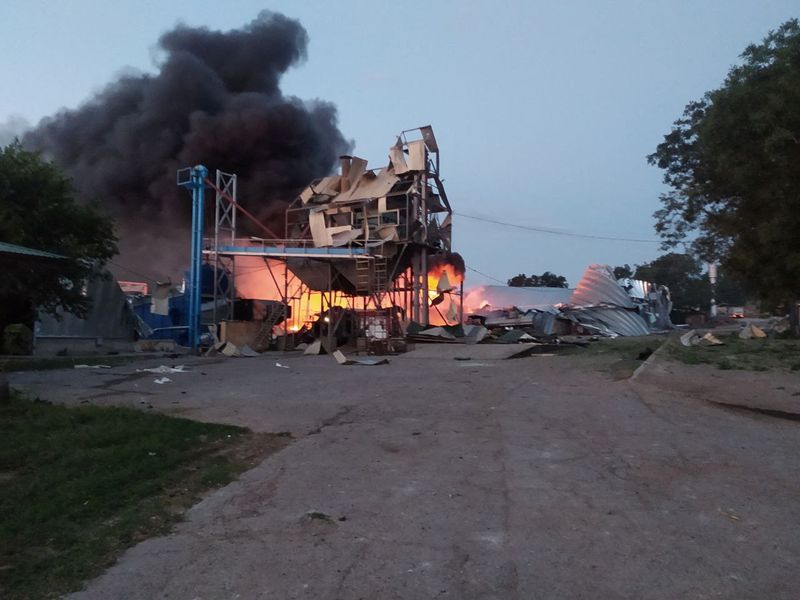Russia hits Ukraine’s grain for fourth day, practises seizing ships
2023.07.21 07:51
2/2

© Reuters. A view shows a grain warehouse destroyed by a Russian missile strike, amid Russia’s attack on Ukraine, at a compound of an agricultural company in Odesa region, Ukraine July 21, 2023. Press Service of the the Operational Command South of the Ukrainian Arm
2/2
By Olena Harmash
KYIV (Reuters) -Russia pounded Ukrainian food export facilities for a fourth day in a row on Friday and practised seizing ships in the Black Sea in an escalation of what Western leaders say is an attempt to wriggle out of sanctions by threatening a global food crisis.
The direct attacks on Ukraine’s grain, a key part of the global food chain, followed a vow by Kyiv to defy Russia’s naval blockade on its grain export ports following Moscow’s withdrawal this week from a UN-brokered safe sea corridor agreement.
“Unfortunately, the grain terminals of an agricultural enterprise in Odesa region were hit. The enemy destroyed 100 tons of peas and 20 tons of barley,” regional governor Oleh Kiper said on the Telegram messaging app.
Two people had been injured, he said. Photographs released by the emergencies ministry showed a fire burning among crumpled metal buildings that appeared to be storehouses, and a badly damaged fire-fighting vehicle.
Moscow has described the attacks as revenge for a Ukrainian strike on a Russian-built bridge to Crimea – the Ukrainian Black Sea peninsula illegally annexed by Moscow in 2014.
Russia said on it would deem all ships heading for Ukrainian waters to be potentially carrying weapons from Thursday, in what Washington called a signal it might attack civilian shipping. Kyiv later responded by issuing a similar warning about ships headed to Russia.
Russia’s defence ministry on Friday said its Black Sea fleet had practised firing rockets at “floating targets” and apprehending ships. Moscow’s ambassador to Washington denied any plan to attack ships.
The attacks on grain export infrastructure and perceived threat to shipping drove up prices of benchmark Chicago wheat futures on Friday towards their biggest weekly gain since the February 2022 invasion, as traders worried about supply.
The U.N. Security Council was due to meet later over the “humanitarian consequences” of Russia’s withdrawal from the safe corridor deal, which aid groups say is vital to stem growing hunger in a string of poorer countries.
The president of Turkey, which brokered the deal alongside the U.N. said, he hoped planned talks with Russian President Vladimir Putin could lead to the restoration of the initiative.
The end of the deal could lead to rising global food prices, scarcity in some regions and potentially new waves of migration, Tayyip Erdogan told reporters on a flight back from a trip to Gulf countries and northern Cyprus.
The West should listen to some of Russia’s demands, he said. “We are aware that President Putin also has certain expectations from Western countries, and it is crucial for these countries to take action in this regard.”
Moscow says it will not participate in the year-old grain deal without better terms for its own food and fertiliser sales.
Western leaders have accused Russia of seeking to loosen sanctions imposed over its invasion of Ukraine, which already exempt exports of Russian food. Russian grain has moved freely through the Black Sea to market throughout the conflict and traders say Russia is pouring wheat onto the market.
WAGNER NEAR POLAND BORDER
A Polish broadcaster reported on Friday that a military reconnaissance drone of unspecified origins had crashed near a base in southwestern Poland earlier this week.
NATO-member Poland has been reinforcing its border with Belarus, where Russia’s Wagner mercenary force has taken up residency after a failed mutiny last month.
The mercenary chief, Yevgeny Prigozhin, was shown on video Wednesday welcoming his fighters to Belarus, and Belarus has said Wagner fighters are now training its troops near the Polish border. People in Poland near the border said on Thursday they could hear shooting and helicopters.
Inside Ukraine, Yuriy Malashko, the governor of the southern region of Zaporizhzhia, reported 80 Russian attacks on settlements in the region in the previous 24 hours, and said that four people had been killed.
A married couple in their fifties had also been killed early on Friday in Russian shelling of the city of Kostiantynivka in the eastern region of Donetsk, the general prosecutor’s office said.
Russia had already used almost 70 missiles and almost 90 Iranian-made loitering munitions to attack so far this week, mostly targeting Odesa and other southern regions, Ukrainian President Volodymyr Zelenskiy said in his nightly video address.
MORE SANCTIONS
The United States on Thursday imposed Russia-related sanctions against nearly 120 people and entities aimed at blocking Moscow’s access to electronics and other goods that aid its war against Ukraine.
Russia’s embassy in Washington said they were part of the “endless attacks” by U.S. President Joe Biden’s administration “in the context of the hybrid war unleashed by the West against our country.”
Russia sent tens of thousands of troops into Ukraine last year and claims to have annexed nearly a fifth of its territory. Moscow says it is responding to threats posed by its neighbour; Kyiv and the West call it an unprovoked war of conquest.
Zelenskiy urged his government on Thursday to keep a tight rein on spending in wartime, prompting his culture minister, a proponent of several high-profile and costly projects, to offer his resignation.
“Cobblestones, city decorations, fountains will have to wait. Victory first,” Zelenskiy said.







